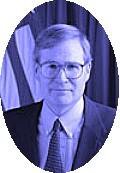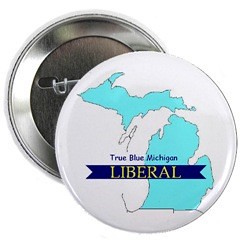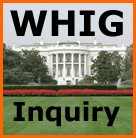Friday, November 04, 2005
Another WHIG (Hadley) and his actions during that key week in early September 2002

Though "White House Iraq Group" and "WHIG" have yet to appear in the New York Times' news pages, they do often print key nuggets about the actions of individual WHIGs, like this mention of Stephen J. Hadley, and his meeting with General Pollari on 9/9/2002 (the day after the Judy Miller/Dick Cheney Iraq War Product Launch in the media, and three days before the Bush Product Launch at the UN). Here is the end of today's article, "Source of Forged Niger-Iraq Uranium Documents Identified" by Elaine Sciolino and Elisabetta Povoledo.
Tags:white house iraq group;WHIG;WHIGgate;Hadley;yellowcake;Plamegate

Though "White House Iraq Group" and "WHIG" have yet to appear in the New York Times' news pages, they do often print key nuggets about the actions of individual WHIGs, like this mention of Stephen J. Hadley, and his meeting with General Pollari on 9/9/2002 (the day after the Judy Miller/Dick Cheney Iraq War Product Launch in the media, and three days before the Bush Product Launch at the UN). Here is the end of today's article, "Source of Forged Niger-Iraq Uranium Documents Identified" by Elaine Sciolino and Elisabetta Povoledo.
[...]a three-part series in La Repubblica, [...] said General Pollari had knowingly provided the United States and Britain with forged documents. The newspaper, a staunch opponent of Prime Minister Silvio Berlusconi, also reported that General Pollari had acted at the behest of Mr. Berlusconi, who was said to be eager to help President Bush in the search for weapons in Iraq.
Mr. Berlusconi has denied such accounts.
La Repubblica said General Pollari had held a meeting on Sept. 9, 2002, with Stephen J. Hadley, then the deputy national security adviser. Mr. Hadley, now the national security adviser, has said that he met General Pollari on that date, but that they did not discuss the Niger-Iraq issue.
"Nobody participating in that meeting or asked about that meeting has any recollection of a discussion of natural uranium, or any recollection of any documents being passed," Mr. Hadley told a briefing on Wednesday in Washington. "And that's also my recollection."
At the time, Mr. Hadley took responsibility for including the faulty information in Mr. Bush's State of the Union address.
This particular piece of the pre-war yellowcake puzzle might make much more sense to Times readers when considered in the framework and timeline of the White House Iraq Group, which is why this blog finds it so frustrating that that pre-existing narrative scaffolding is never used by the Times.
Tags:white house iraq group;WHIG;WHIGgate;Hadley;yellowcake;Plamegate



